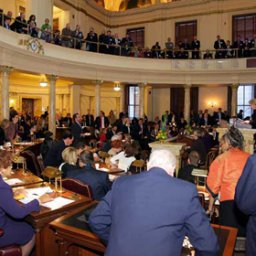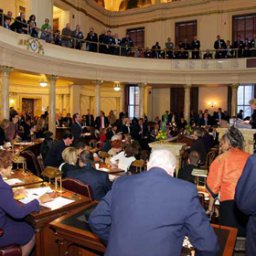Senate Health Panel Approves Package Designed to Improve Patient Safety and Strengthen Hiring, Training and Oversight at State Psych Hospitals
TRENTON – A package of bills sponsored by Senate President Richard J. Codey that are designed to protect patient safety and improve employee training and oversight at state psychiatric hospitals was approved yesterday by the Senate Health, Human Services and Senior Citizens Committee.
“These hospitals are home to some of the state’s most vulnerable residents,” said Sen. Codey (D-Essex). “We need to ensure that they are in the care of staff that are appropriately trained and focused on their best interests. These bills will transform the way we care for the mentally ill and address a number of patient safety issues that have arisen at state-run facilities.”
Sen. Codey worked closely with the Public Advocate’s office in drafting these bills, in part, to address a number of injuries and deaths that had arisen recently at state facilities such as Ancora Psychiatric Hospital.
Bill S2492, would require the Department of Human Services (DHS) to establish a training program for staff members who work directly with patients at state psychiatric hospitals in order to ensure the delivery of safe, secure, and therapeutic care. Utilizing best practices in patient treatment, the curriculum would include topics such as state and federal reporting requirements, patient safety, disease prevention, health wellness activities, anger management, skilled decision-making and how to deal effectively with life-threatening emergencies.
The bill would require DHS to establish an on-site educational assessment and remedial instruction program at each state psychiatric hospital in order to evaluate the proficiency of all staff members who work directly with patients.
The bill would also require the commissioner of DHS to establish minimum educational standards for staff members at a hospital who work or will work directly with patients. Applicants for employment at the hospital who will work directly with patients would be required to meet the standards as a prerequisite to being hired at the hospital. Employees already working directly with patients at the time of the bill’s enactment would be required to undergo an evaluation to determine if they meet the educational standards or require remedial instruction through the on-site education program. Any employee that refuses to participate in the training program or fails to meet the educational standards and refuses to participate in remedial instruction, would be terminated from employment at the hospital.
“In order to deliver the best care, we have to produce the best employees. Education is paramount to achieving that,” added Sen. Codey. “These bills focus on knowledge, compassion and competency in training staff to deliver a gold standard of care for those struggling with mental illness.”
The second bill, S2493, would require current and future employees of state psychiatric hospitals, developmental centers and veterans’ memorial homes to undergo drug testing for controlled dangerous substances as a condition of employment. Employees would also be subject to future random testing or testing if the employee’s immediate supervisor has reasonable suspicion to believe the employee is illegally using a controlled dangerous substance, based on visible impairment or professional misconduct which relates adversely to patient care or safety.
The last bill in the package, S2494, would require DHS to report the number of physical assaults and deaths that occur at state psychiatric hospitals. The report would be a public record, posted on the official DHS website, and updated quarterly, but would not contain any identifying information about patients or staff members. Additionally, the bill would require that DHS notify the Public Advocate within 24 hours after an unexpected death occurs at a state psychiatric hospital and promptly notify the Public Advocate of any death of which DHS has knowledge that occurs within seven days after a patient was discharged from a state psychiatric hospital.
# # #



